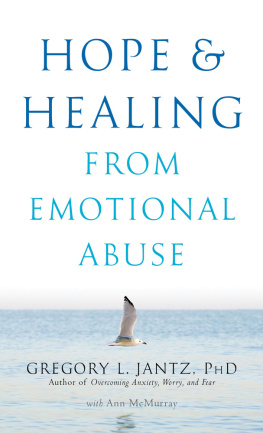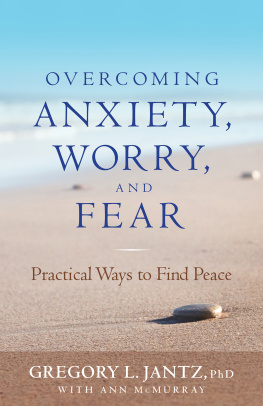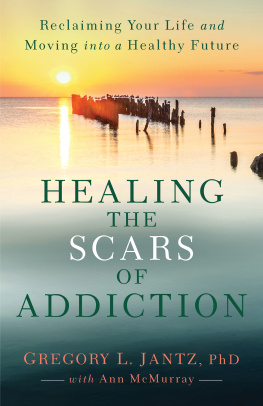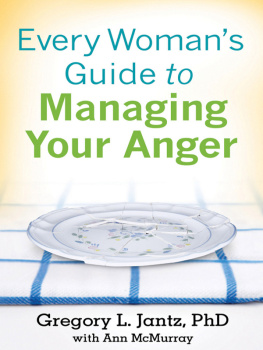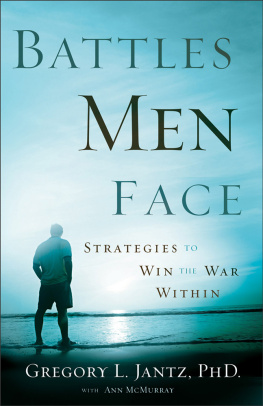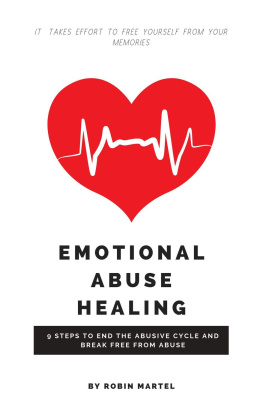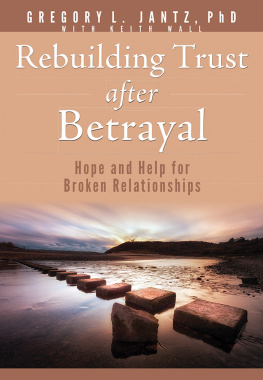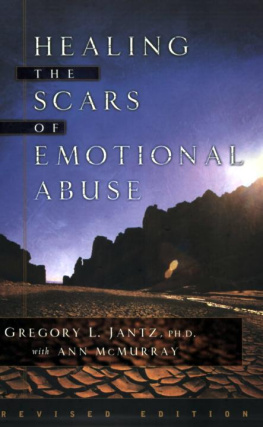Gregory L. Ph.D. Jantz - Hope and Healing from Emotional Abuse
Here you can read online Gregory L. Ph.D. Jantz - Hope and Healing from Emotional Abuse full text of the book (entire story) in english for free. Download pdf and epub, get meaning, cover and reviews about this ebook. year: 2013, publisher: Baker Publishing Group, genre: Religion. Description of the work, (preface) as well as reviews are available. Best literature library LitArk.com created for fans of good reading and offers a wide selection of genres:
Romance novel
Science fiction
Adventure
Detective
Science
History
Home and family
Prose
Art
Politics
Computer
Non-fiction
Religion
Business
Children
Humor
Choose a favorite category and find really read worthwhile books. Enjoy immersion in the world of imagination, feel the emotions of the characters or learn something new for yourself, make an fascinating discovery.
- Book:Hope and Healing from Emotional Abuse
- Author:
- Publisher:Baker Publishing Group
- Genre:
- Year:2013
- Rating:5 / 5
- Favourites:Add to favourites
- Your mark:
- 100
- 1
- 2
- 3
- 4
- 5
Hope and Healing from Emotional Abuse: summary, description and annotation
We offer to read an annotation, description, summary or preface (depends on what the author of the book "Hope and Healing from Emotional Abuse" wrote himself). If you haven't found the necessary information about the book — write in the comments, we will try to find it.
Gregory L. Ph.D. Jantz: author's other books
Who wrote Hope and Healing from Emotional Abuse? Find out the surname, the name of the author of the book and a list of all author's works by series.
Hope and Healing from Emotional Abuse — read online for free the complete book (whole text) full work
Below is the text of the book, divided by pages. System saving the place of the last page read, allows you to conveniently read the book "Hope and Healing from Emotional Abuse" online for free, without having to search again every time where you left off. Put a bookmark, and you can go to the page where you finished reading at any time.
Font size:
Interval:
Bookmark:

1995, 2003, 2009 by Gregory L. Jantz
Published by Revell
a division of Baker Publishing Group
P.O. Box 6287, Grand Rapids, MI 49516-6287
www.revellbooks.com
Spire edition published 2013
Previously published under the title Healing the Scars of Emotional Abuse
Ebook edition created 2013
All rights reserved. No part of this publication may be reproduced, stored in a retrieval system, or transmitted in any form or by any meansfor example, electronic, photocopy, recordingwithout the prior written permission of the publisher. The only exception is brief quotations in printed reviews.
ISBN 978-1-4412-4296-9
Unless otherwise indicated, Scripture quotations are from the Holy Bible, New International Version. NIV. Copyright 1973, 1978, 1984 by Biblica, Inc. Used by permission of Zondervan. All rights reserved worldwide. www.zondervan.com
Scripture marked NASB is taken from the New American Standard Bible, Copyright 1960, 1962, 1963, 1968, 1971, 1972, 1973, 1975, 1977, 1995 by The Lockman Foundation. Used by permission. www.lockman.org
To protect the privacy of those involved, names have been changed in all of the case studies used in this book.
Cover
Title Page
Copyright Page
Part 1: Understanding Emotional Abuse
1. What Is Emotional Abuse?
2. Why Is Emotional Abuse So Common?
3. Why Is Emotional Abuse So Damaging?
Part 2: Types of Emotional Abuse
4. Emotional Abuse through Words
5. Emotional Abuse through Actions
6. Emotional Abuse through Neglect
7. Spiritual Abuse: The Bible as Bludgeon
Part 3: The Effects of Emotional Abuse
8. The Effects on Sense of Self
9. The Physical Effects
10. The Effects on Relationships
Part 4: Overcoming Emotional Abuse
11. Recognizing Your Abuse and Its Effects
12. Getting Over the Past and Living for the Future
13. A Time to Heal: Restoring Your Self
Emotional Abuse Checklist
Notes
Resource List
About the Authors
Back Ad
Back Cover
Why Is Emotional Abuse So Damaging?
Emotional abuse is so damaging because it outlives its own life span.
Robert is thirty-two years old and has trouble holding a job. He grates on peoples nerves with his abrasive, blunt outbursts of displeasure at their behavior. Because of his inability to deal effectively with others, Robert is most successful at jobs in which he can work alone. Unfortunately, while Robert works best alone, he also works slowly. He constantly second-guesses his own judgments on the job. Caught up in daydreams, he spends a good portion of his time imagining how people will react to his work and what he will do and say in response. He wants to be ready for what he knows will come. Expecting and even anticipating a negative reaction, he seems to enjoy it, since it vindicates what he has believed they were thinking all along. He is happy inside because he was right. To others, Robert comes across as defensive and hostile because he is already sure that any response to him will be negative.
Robert grew up as the youngest of three children. His older siblings couldnt relate to his childish behavior. He was raised with the indelible impression that his brother and sister were smarter, better looking, and bound to be more successful than he could ever hope to be. His parents loved him, but Robert always had the sense that he was an afterthought, that the real tradition of the family would be carried on by the older, more capable children.
In school, Robert was always teased by the other children who knew his brother and sister. He was a thin, unattractive child whose dour expression set up a barrier without him speaking a word. Robert seemed to want to be left alone, and others were more than happy to oblige.
Robert grew up feeling that he would never amount to anything, that who he was as a person was not valued, and that people would always deal with him in a negative manner. Anticipating their reactions, Robert sought to beat them to the punch by being openly hostile and abrasive in all of his relationships.
Even therapy was a battle zone as far as Robert was concerned. He didnt like his therapist, didnt like her conclusions, and didnt like having to change the way he had always dealt with the world. Robert didnt want to take the chance of being hurt, yet neither did he want to continue living the way he was living now.
Roberts recovery will be slow, but as long as he listens to the truth, which softly whispers above the clamor of his self-doubt that he really is a valuable person, one day Robert will finally believe it.
Emotional abuse is so damaging because it outlives its own life span. Not only does it damage a persons self-esteem at the time it is done, it also sets up a life pattern that daily assaults the inner being. Present events and relationships are filtered through the negative messages and events of the past. Behavior is unknowingly modified to produce results consistent with the established life pattern. Through continued emotional assault, even a healthy life pattern can be subverted by an abusive one.
Damaging Effects of Emotional Abuse
When you view life as unstable, anxiety, tension, and fear result.
When you are constantly vigilant to the behavior of others, hypersensitivity and hostility result.
When you learn to second-guess yourself, confusion and feelings of disconnection result.
When nothing you do ever seems to be right, insecurity, guilt, and shame result.
When others tell you that you are always wrong, indecision and inaction result.
When you stop having the energy to fight it all, apathy and depression result.
When you have finally had it, rage results.
When you never seem to receive fairness, justice is all you think about.
When you have been hurt by those you love, love is viewed as a risk.
When living is painful, addictions are acceptable because they numb the pain.
When the mind is a jumble of emotional chaos, the body and its systems break down.
When your inner turmoil produces outer stress, your current relationships are endangered.
When you cant control your negative emotions, you become the very person you hate.
Dont ever let anyone tell you that emotional abuse isnt damaging.
Lack of Emotional Security
At the most basic level, emotional abuse robs you of your sense of security and value. In an attempt to bring order out of chaos, even the regularity of abuse can be substituted for a sense of what is normal.
One of the deepest needs of children is for consistency, including the certain knowledge that they are unconditionally accepted and valued by those who love them. Small children crave the repetitive, constant nature of certain stories in which the same words or phrases are used over and over again. Children learn what to expect, anticipate with delight the coming use of the word or phrase, and feel in control of the story when they can repeat along with the storyteller the right words at the right time. Toddlers will often ask for the same book to be read over and over again until parents are so sick of it they could just scream! What is boring to adult minds may be very comforting and affirming to children. The story always ends the same way. Life has order. By knowing the ending in advance, children have a sense of security and safety. They learn how it feels to be right, to know what lies ahead, and this produces a sense of control.
With emotional abuse, whether through purposeful or inadvertent neglect, children soon learn that anything is possible. They never know the ending in advance. There are no boundaries for behavior directed toward them or attitudes thrust upon them. And where there are no boundaries, there is no security. A study of childrens reactions to physical boundaries on their school playground found that when a fence was present in their school yard, they happily played right up to its crisscrossed edges. They knew where the boundary of their world was and took advantage of every inch; it allowed them to relax and play in safety. When the fence was removed, the children huddled together close to the school building and did not venture down the hill to where the fence had been. Without the fence, they did not have a clear sense of boundary, of security. Instead of the removal of the fence promoting greater freedom, it produced heightened anxiety and unpredictable behavior. The presence of the boundary brought freedom. Removal of the boundary brought fear.
Font size:
Interval:
Bookmark:
Similar books «Hope and Healing from Emotional Abuse»
Look at similar books to Hope and Healing from Emotional Abuse. We have selected literature similar in name and meaning in the hope of providing readers with more options to find new, interesting, not yet read works.
Discussion, reviews of the book Hope and Healing from Emotional Abuse and just readers' own opinions. Leave your comments, write what you think about the work, its meaning or the main characters. Specify what exactly you liked and what you didn't like, and why you think so.

